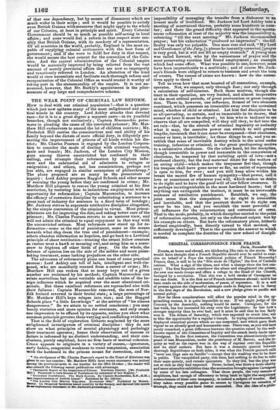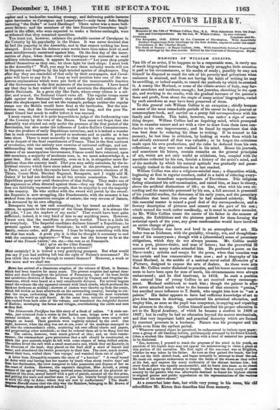ORIGINAL CORRESPONDENCE FROM •FRANCE.
Paris, November 80.
Events, at home and abroad,-are thickening like rain in the storm. Who would have thought that a French Republic should ever be called to exer- cise on behalf of a Pope the traditional politics of French Monarchy!
France, then, is still to be the" abide de l'Eglise," the first of Catholic nations. What a sign of the times, and what a change since the last cen- tury( The firstRepublie overthrew the altars and slaughtered the priests; the new one sends troops and offers a refuge to the Head of the Church, besieged by a revolution. That this was a bold stroke of Cavaignac no one can doubt. It is the first act of French interference abroad; and it has been made on the side of moderation, of peace, of repression. It is a sort of protest against the disgraceful attempts made in Belgium and in Savoy in the first days of the Revolution, and a new pledge given to pacific and normal policy. How far these considerations will affect the popular mind in the ap- proaching contest, it is quite impossible to say. If we might judge of the Country by the Assembly, nothing would be easier. Cavaignac, for the last week, has but increased his sway over the Legislature: he has -now s stronger majority than he ever had; and it must be said that he has fairly won it. The debate of Saturday, which was expected to crush him, was to him the opportunity for a regular triumph. In trying circumstances, he displayed oratorical powers which no one suspected, and which gave fresh vigour to an already good and honourable case. There was, as you will have surely remarked, a great difference between the question raised by the well- known report of the Committee of Inquiry and the attack lately made upon Cavaignac. In the first instance, the Committee was almost entirelyzona- posed of late Monarchists, under the presidency of M. Barrot; and the in- quiry as well as the report was in the way of reprisal over the Republic and its chief authors. But here it was a domestic quarrel between thorough Republicans on both sides; it was what the French proverb calls " laver son lingo sale en female "—except that the washing was to be done in public. The vanquished party, this time, bad nothing to do 'but to take their seats quietly, and remain spectators. So they did, but the play was not so rich as they had expected. Never, indeed, was there a more shabby and more miserable exhibition than the accusation brought against Cavaignac by some of his late colleagues. That these people, the very essence of stupidness, had enough of effrontery to bring back to light the sanguinary remembrance of their own incapacity, is indeed a subject of wonder. Had they taken every possible pains to secure to Cavaignac an occasion of triumph, they could not have better succeeded. But the idea of-a philo- sopher and a bookseller teaching strategy, and delivering public lectures upon barricades to Cavaignac and Lamoriciere!—only fancy John Bright lecturing " the Duke" or Lord Hardinge! There never was a more ludi- crous failure; and the members of the late Executive Committee impli- cated in the affair, who were expected to make a furious onslaught, were so ashamed that they remained speechless.
You must not, however, estimate the probable success of Cavaignac in the Country by his popularity in the House. It was never doubted that he had the majority in the Assembly, and in that respect nothing has been changed. Even from his defence some words have been taken hold of, and most mischievously construed against him. On the first day of the insur- rection of June, when from every side Cavaignac was entreated to send military reinforcements, it appears he answered—" Let your shop-people defend themselves as they can; let them fight for their shops: I must look to the Assembly I " Well, you may be sure these unlucky words will not be forgotten nor forgiven by the high-minded species of shopkeepers. Day after day they are reminded of that sally by their newspapers, and Cavai- gnac will have to pay for it. I may as well mention here one of the nu- merous explanations which were put forth of the unaccountable inaction of the Government in the first moments of the insurrection. I have heard say that they in fact waited till they could ascertain the disposition of the Garde Nationale. Ina great city like Paris, where every citizen is a sol- dier, and armed, the National Guard rules all. The regular troops never fight against the National Guard; they seldom fight well without. If in June the shopkeepers had not set the example, perhaps neither the regular troops nor the Mobile would have fired at the barricades. But the mis- fortune was, that the Government waited too long, and the poor Na- tional Guard had much to suffer before it was rescued.
I must repeat, that it is quite impossible to judge of the forthcoming vote of the Country by the vote of the House. You must not forget that the Assembly was elected not only under the pressure of the first period of the Revolution, but also under the influence of Ledra-Rollin's Commissioners. It was the produce of early Republican terrorism; and it is indeed a wonder that in such circumstances it proved so moderate and so pacific as it has been since. There is most assuredly in that simple fact a strong motive not to despair of the final resettlement of France. That in the first outburst of revolution, with the entirely new exercise of universal suffrage, and not withstanding the most reckless, desperate, immoral, and despotic inter- ference of an unscrupulous Government, France could have returned, upon 900 members, a majority of moderate men, is, we must acknowledge it, a great fact. But still, that Assembly, even as it is, is altogether more Re- publican than-the country itself. That you may safely calculate, by the in- dividual returns which have since taken place in the provinces, and even in Paris; and of which the results have been the successive elections of M. Thiess, Count Mold, Marshal Bngeaud, Bonaparte, and I might add M. Guizot if he had not declined an all but certain nomination. The Anti- Republican party now avail themselves of that feeling. They make use of the argument so often directed against them—they say that the Assembly does not faithfully represent the people, that its majority is not the majority in the country. He who strikes with the sword will perish by the sword: the Republic is now struggling, like Frankenstein, with the monster it has evoked from the mysterious energies of nature; the very reverse of Saturn, it:is devoured by its own offspring.
Bonaparte has at last said something; he has issued an address. Of course, be appeals to the memory of the Great Emperor: it is always the old joke, " I am the nephew of my uncle." That would have been quite sufficient ; indeed, it is very kind of him to say anything more. However, I must own that the manifesto is cleverly worded. There is a little bit for everybody. The Imperial candidate declares himself a Republican; he protests against war, against Socialism; he will maintain property and family, restore order, and finances. I hope he brings something with him for that last work. A great pity it is that he thought it necessary to end with the customary rigmarole—" When one has the honour to be at the head of the French nation," etc. etc.—the rest as at Franconirs.
"Ah qu'on est fier d'etre Francais Quand on regarde la colonne l "
Most certainly! it is indeed a very gratifying prospect. But what would you say if you had nothing left but the sight of Nelson's monument? Do you think this would be enough to restore finances? However, a week or two more and we shall see.



























 Previous page
Previous page